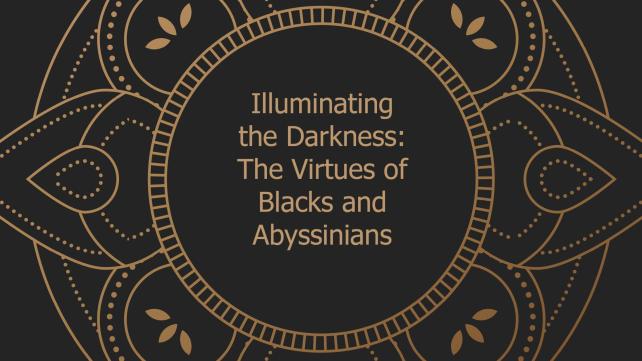
The recognition of skin color, racial identity, and lineage have been a part of human interaction since human beings have wandered the Earth. Our brains tend to categorize people at first glance. We see a stranger and we group them according to their similarities to people or things we already know. The categorization of people helps us interact with them initially and predict their behaviors, even when we don’t much about them except their physical appearance. We list them, subconsciously, as friend or potential foe, according to that initial reaction. Later, as we learn more information about the person, we refine our impressions and get to know the person as an individual.
The difference in our skin color has always provoked contemplation and assumptions. One day, the great scholar of Baghdad, Abu’l Faraj Ibn Al Jawzi (c. 1115-1200 C.E.), encountered some noblemen from Abyssinia, the ancient name of Ethiopia. These men, who were now in a land where there were people of varying skin tones, began to lament their skin's dark color in comparison to others’ complexions. As a response to their concerns, al Jawzi wrote the book Illuminating the Darkness: The Virtues of Blacks and Abyssinians.1 It was his way of not only acknowledging the Abyssinians' concerns but of publicly appreciating blackness.
Illuminating the Darkness belongs to the literary genre fada’il or writings about the excellent qualities of a person or thing. In it, Al-Jawzi extols the good qualities of blackness, Black people, and people from the Abyssinia lineage. Beginning with the origin of the Black race, and the cause of darkness in skin color, he writes about notable men and women of darker hue.
Al-Jawi’s book is both an affirmation and a negation. He affirms the value of Black people and many things that are naturally black in color. For example, he writes about the healing properties of black seed and about the excellent qualities of the black fruit of the juniper tree. Several sections are devoted to the magnificence of the Black Stone of the Kaaba.
Most of the book discusses the positive qualities of Black people, including Black members of the Quraysh tribe and the Black Abyssinians like the great leader Al-Najashi who received and protected the early Muslim emigrants from Mecca. He cites “strength of body, bravery, generosity, eloquence, and ease of expression as examples of some of the admirable qualities of Black people. There are brief biographies of some of the noble Black people of history like Luqman the Wise and Ham (the son of Prophet Nuh), whom he names as the progenitor of the Black race. He mentions Black companions of Prophet Muhammad, peace and blessings be upon him. Among some of the personalities he mentions are Umm Ayman (the wet nurse of the Prophet), Ata ibn Abi Thabit, Umm Zufar (the epileptic woman who asked the Prophet to pray for her).
The book, however, is also a negation. Al-Jawzi dispels any idea that skin color can be the basis of superiority of one group over another except by way of piety and good deeds.
Al-Jawzi was a prolific writer, penning such books as the seminal Talbees ul Iblis (The Deception of Iblis) and Al-Mawdu‘at al-Kubra (A Great Collection of Fabricated Traditions). He is said to have written over 700 works, not all of which were completed.
Some critics say that Al-Jawzi was not extremely meticulous in his fact-checking process, including some hadiths in his works that were weak narrations. Many of the book’s assertions are made without evidence and there are gross over-generalizations. Despite these shortcomings, the book has great value. It is a must-read for anyone who desires to understand how the early Muslims viewed the concept of Blackness.
Endnotes
1 Ibn al-Jawji, Abu’l-Faraj. Illuminating the Darkness: The Virtues of Blacks and Abbysinians. Dar ul Arqam. Birmingham, UK. Adnan Karom, Trans. Ayman Khalid, ed. (317 pages)
Candice “Sister Islaah” Abd’al-Rahim reverted to Islam in 1976 and considers herself a student of knowledge. She has deep education credentials which include an M.A. in Teaching, a Certificate of Advanced Studies (Post-Masters) in Administration and Supervision, a B.S. in English, and experiences as a principal (in fact the first hijab public school principal in Maryland!), curriculum and staff developer, mentor, and classroom teacher of grades pre-K through 12. She is a former adjunct professor at Johns Hopkins University’s Graduate School of Education and is a doctoral candidate in Islamic Sciences at the International Online University. Islaah’s contributions to the field have earned her honors in the Who’s Who of Distinguished JHU Alumni. She is wife, daughter, mother, and grandmother and is an active member of several Muslim communities in the Baltimore area.



Add new comment